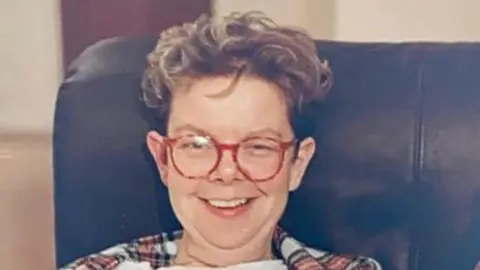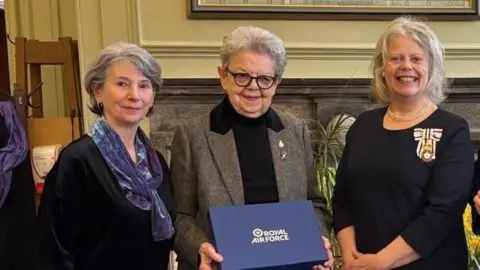‘I had a criminal record for 56 years for being a lesbian – nobody told me’
48 minutes agoJosh ParryLGBT & Identity Reporter

 Liz Stead
Liz SteadA woman who unknowingly had a criminal record for 56 years for being a lesbian in the military is encouraging more women to apply to a government pardons scheme.
Liz Stead, 78, was thrown out of the RAF in 1969 when bosses discovered a love letter from her then-girlfriend.
More than 50 years later Liz discovered she was also given a criminal conviction for “perceived same-sex sexual activity” and had unknowingly lived with a criminal record for most of her adult life.
She is one of 40 people in England and Wales who have had convictions of this nature overturned since 2023, when the government’s Disregards and Pardons Scheme was expanded to include women for the first time.
Liz, from Chichester, West Sussex, first learned of her criminal record in December last year, when applying for a different scheme, which awards financial redress to veterans who were sacked during a ban on homosexuality in the armed forces which was lifted in the year 2000.
In emails seen by the BBC, her application for the payment was initially denied because of the conviction, and she was advised to apply for it to be pardoned by the Home Office.
She applied to have the application fast-tracked due to ill health – and says she was “astonished” to learn of the charges.
She now wonders what unknown impact it has had on her life.
“I can think of one job where it might have been the reason I didn’t get it. I’ve worked in local government most of my life and I have to wonder, had they known about this, would I have still had that job?,” she said.
In 2012, the government’s Disregards and Pardons scheme was launched to allow people historically convicted for consensual same-sex activities to have those convictions deleted from official records.
The scheme was expanded in 2023 to include women and more former military personnel affected by the pre-2000 ban on LGBT+ service members.
Since the expansion, there have been 40 people given pardons, with the majority granted to former military personnel.
Liz is now encouraging other women who may have been in contact with police, or those who were thrown out of the military for their sexuality to apply for pardons in order to find out if they have an unknown conviction.
She said: “I can’t think how it is on my records and I’ve never known about it, but I can’t be the only one, they can’t have just pinpointed me.
“I didn’t know anything about it, so I had no idea what the pardon would even be for but I was told it was related to same-sex activity.”

 Liz Stead
Liz SteadLiz served for three and a half years in the RAF and had an exemplary record, but was thrown out when bosses investigated her then-girlfriend and found love letters between the two.
She was interrogated by the Special Investigation Branch – the detective arm of the military police which at the time often focussed investigations on same-sex sexual activity – and dismissed.
The partial decriminalisation of homosexuality began in the UK in 1967 with the passing of the Sexual Offences Act, which decriminalised homosexual acts between men over the age of 21 in England and Wales.
In Scotland, the law was changed in 1980 and in Northern Ireland, 1982.
However, homosexuality remained illegal in Britain’s armed forces until the year 2000, when the European Court of Human Rights ruled the ban illegal.
As part of reparations made to LGBT Veterans, Liz was invited to a ceremony to return her medals and re-welcome her into the military family.
Although the day was once a fond memory for her, she said it was now “tainted” because of the criminal record and she might have considered not attending had she known about that at the time.
Peter Gibson, CEO of LGBT+ military charity Fighting With Pride, which helped Liz apply for the pardon, said: “Liz’s experience shows how important it is that justice is properly done to all LGBT+ veterans who suffered under the cruel ban. Lives and careers were ruined under that ‘gay ban’.
“It’s shocking that some people who served for their country and were kicked out for simply being their true selves might also have had a criminal record without even knowing.”
Safeguarding minister Jess Phillips said that criminal records for same-sex relationships “should never have existed in the first place.”
She added: “Each pardon represents real changes to real lives. Some could now have their military medals returned while others can finally walk taller knowing a painful injustice has been finally righted.
“I urge anyone with convictions under these cruel and prejudiced laws to apply to our scheme. You deserve justice and we remain committed to righting these historical wrongs.”